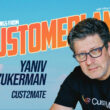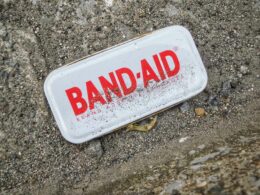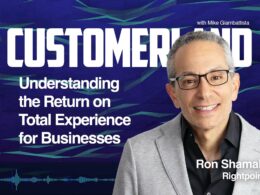Can sustainable customer loyalty truly exist in the airline industry? Join us for a captivating conversation with a true innovator in the world of loyalty and sustainability. Our guest shares their awe-inspiring journey from British Airways, Ernst & Young, and Jet2.com to breaking new ground with Emirates, FlyB, and the Green Aviation Summit. Discover how the airline industry grapples with the oxymoronic concept of sustainable loyalty and the impact of corporate travel policy on the intention-behavior gap for business travelers.
Navigating the challenges of encouraging sustainable air travel is no easy feat. We dive deep into the complexities of motivating loyalty scheme members to offset their carbon emissions and explore the factors at play, such as transparency, trust, climate knowledge, and the effects of Covid on travel behavior. Learn how the corporate travel market and airline associations have differing perspectives on travel and the crucial role that effective communication plays in helping consumers understand the implications of their choices.
As we journey through the fascinating intersection of sustainability communication and change management, we examine the impacts that lead certification has on property sales and leasing, as well as the ways professional service firms like PWC in the Netherlands are adapting to meet their customer base’s demands. Join us as we uncover valuable lessons in revolutionizing customer engagement, environmental responsibility, and the future of loyalty and change in the travel industry. Don’t miss this insightful discussion that will leave you questioning what you thought you knew about loyalty and sustainability.
Full Transcript Below
Mike Giambattista
Your personal evolution from pure loyalty to kind of leveraging loyalty levers, sustainability purposes, i think lends itself to all kinds of really cool things that are personally fascinating to me. I also think that you’re one of the few people I’ve spoken with that are kind of taking loyalty to new places where it’s probably destined to go anyways, but you’re probably one of the first few people who are doing that. So it’s not just a pure loyalty or loyalty outcomes mindset. We’re trying to change the world. I say we, you are.
Madeleine Anderson
Yeah. So, Yeah, no, i would agree. You know I position myself very much now as poacher turned gamekeeper because until COVID came along, my area of expertise that I was really known for was in the loyalty arena and also co-brand credit cards. So again, if I take you back to my infancy in loyalty, i worked for British Airways and I was involved in the launch of Air Miles in Ireland before it was integrated into the Executive Club And I at one stage I managed the Executive Club for the UK and then subsequently managed all of the partners, so airlines not airlines hotels, cars, et cetera, but from a loyalty perspective. From there I joined Ernst Young as a CRM consultant and I worked there on a number of different industry sectors So automotive, some telco as well, were the primary ones really I. After a few years with Ernst Young I took a career break and went off to retrain as an interior designer. So I’m used to reinventing myself.
Mike Giambattista
Natural career progression, of course.
Madeleine Anderson
Absolutely. It’s the creative side, the creative execution. So in some respects the journey is not so different. You just get to see more of the output though. But I never quite escaped the airline world because I kept getting pulled back for various consulting projects and interim management roles et cetera. So I joined Jet2.com as a consultant, initially for three to six months, helping them launch their loyalty program. I subsequently departed three years later and from there worked with Emirates, and that was helping them launch their co-brand credit card in the UK marketplace, and from there more or less what year was that?
Mike Giambattista
Give me a time The Emirates, one.
Madeleine Anderson
That would have been about nine years ago,
Mike Giambasttista
Okay. All right, i think I recall the news item about that period, but anything over maybe a week ago is very fuzzy for me.
Madeleine Anderson
I know the feeling well. So from there I also worked with FlyBe, the first iteration of FlyBe. I had an interim management role there And that was the end of my interim management type roles, because I then got more involved with Airline Information and for two years I chaired all of their conferences internationally, So apart from South America. So that included their loyalty, co-brand credit cards, ancillary revenue, loyalty fraud and airline payments. Now the second year of that was when COVID hit.
So, having expected to be flying around the world, I was then flying around the world from behind a screen. So I had already started thinking about what was next for me And I literally had a series of conversations which almost led to sort of the perfect storm where I was talking to people in consulting, for example, who were saying that in the aviation space they were getting a lot more calls about sustainability. So that started the brain cells going And I ultimately decided to do a Masters. So fortunately I live in Bristol and one of the great programs in the UK is in Bristol, at the University of West of England. So I started that two years ago. I submitted my final piece of work on the day that I met Ingrid.
Mike Giambattista
Is that right?
Madeleine Anderson
Yes, 6.25 that morning, and then found myself sitting on a panel talking about sustainable loyalty in the afternoon.
But during that time my desire really was to keep an open mind as to what happened next, to build on my travel experience, but also to be open to learning about different sectors. That said, a number of the things that happened during that time sort of kept pulling me back to travel, if you like. So I, for example, i was asked to chair the Green Aviation Summit at the World Aviation Festival, which was really my first opportunity to integrate my old world with my new world. I also did some research work for Enterprise Ireland, where I was looking at what was happening in the terms of airlines etc. Starting to look at sustainability within their supply chains.
So that was really interesting, getting a much better understanding of the scope one, two and three, looking at airports as well and really appreciating the systemic change that is required. And then, finally, on my dissertation or I think you call them thesis over there, I’m not quite sure, but I looked at the impact of corporate travel policy on the intention behavior gap for business travelers, specifically looking at air. And that really is what brought me into the Sustainable Loyalty Panel, where again it gave me the opportunity to sit in front of my old tribe, but with a slightly different message, and the quick answer to sustainable loyalty, in my view, is in the airline arena specifically. It’s an oxymoron because you’re encouraging people to do more of something that actually, at the moment reducing demand is essential.
Mike Giambattista
If you’ll permit a few really broad strokes. When loyalty first exploded as a concept and as an industry, i think it had to do with two things. Primarily, one was that there were now reproducible methods to build long-term relationships and stickiness within those relationships, and all the benefits come with it. But then somebody somewhere realized that we have got all this new at the time ancillary data on our customers. I wonder what we could do with it, and that grew into its own industry And that was, in my view, kind of the chapter one of this. Maybe 10 years ago we were still in that phase, i don’t know.
But there’s been a constant morphing of what people are doing in loyalty, how loyalty technologies are being used and leveraged and scrub that up against customer expectations. That just shifted wildly through pandemic and the technological shifts that had to happen to sustain that and the entire landscape. The game board was just shaken. And yet I hear a lot of people and colleagues, people that I’m very fond of and close with, talking about the next iterations of loyalty and so much of it, and these people have to forgive me when this airs. So much of it is just, they’re just iterations. There’s nothing revolutionary to come up with these concepts other than you know. We’ve got a new function or new feature, or we can do this now that we couldn’t, but it’s all on the same lines And you are perhaps the first person I’ve come across that that’s taking the precepts of loyalty, marketing, loyalty engagement, customer engagement and applying them toward making the world a better place, which I think is, on one hand, it’s really commendable And you are to be commended for that.
On the other hand, why hasn’t anybody else joined that similar, you know, if not for sustainability? but there are another dozen tracks where we could use loyalty mechanics and data to make the world a better place. And I’m really interested to know, like, are you nudging your colleagues, saying, come with me, or are we not quite there yet? at your at the Airline Information conference that you most recently spoke at, What was the response to that? because truly, you were probably. Plus, these folks are your colleagues and friends. You’re probably speaking to them things they didn’t really want to hear.
Madeleine Anderson
Yeah, I think that for me, what you’ve just said there raises all sorts of questions as well, so I’ll see if I can address some of those.
Firstly, sitting in a room in front of my colleagues who were as I described them earlier they were previously my tribe And giving a different message was my first opportunity to test my own nerve, to be authentic, because my thinking, my beliefs, have changed over the last few years.
So I recognize there are a number of people who aren’t in the same place as me, but I feel sufficiently strongly that I want to share the message, but in a way that is palatable, because one of the things that I know about sustainability is that there’s a lot of scaremongering and what that tends to do to people is it switches them off and they go la, la, la la. So that’s part of it, I think. In terms of how it was received, interestingly, iIwas approached by a number of people afterwards who agreed with what I was saying, and I think one of the challenges was that there were people in the room whose job it is to work in the loyalty space and they are still working on growth, although their personal beliefs might not support that. They’re not in a position to say so, and I think there’s probably a lot of that going on at the moment, which is a difficult one, because until people start to speak out, that’s not going to change radically.
Sponsor Announcement
I want to take a quick break from the conversation to tell you about one of our sponsors. What could you achieve if you knew what your customers expected ahead of time? What if you could know what customers expect by category and by brand, 12 to 18 months ahead of traditional brand tracking methods? And what if you could know exactly where to adjust and where to spend in order to drive the most benefit? every time, a customer expectation audit allows you to identify areas that require strategic reinforcement, as well as pinpoint which values will contribute most to an emotional bond with your brand and optimize accordingly. Customer land has partnered with brand keys, the world’s oldest loyalty-focused consumer research firm, to bring real-world customer expectation audits to brands, brand managers and to CX. Practitioners everywhere Want to know where your brand stands and exactly what to do about it. Go to expectationaudit.com and download a sample audit today.
Madeleine Anderson
One of the other things you mentioned is why aren’t loyalty programs making bigger changes around this? Well, you’re seeing programs being positioned as green loyalty programs, et cetera. I think green is being used rather liberally.
Mike Giambattista
Right.
Madeleine Anderson
And I believe that a number of the changes being put out there to promote green loyalty are very much along the lines of greenwashing. So that’s part of it. I think the other part is it’s rearranging the furniture, because if you look at the SCOPE-1 emissions in the UK marketplace for airlines, 99% of their missions sit in SCOPE-1, which is enormous. Of that, 99% for UK-based airlines between 90 and 99% of that is generated through the use of aviation fuel. So that shows you very quickly where the biggest difference is required. So with the best will in the world, you know, encouraging your loyalty scheme members to a carbon offset for their flight. Firstly, you’re not paying the true cost of the carbon. So for me it’s an excuse to continue bad behavior, if you like. It might make people feel better, but it doesn’t make a fundamental difference.
I think the other part around carbon offsets are, you know, even the gold standard ones some of them are now coming into question And the other part of it is t through the EU ETS scheme, so the emissions trading scheme the airlines are paying into pots to offset. So in some respects you’ve got airlines asking their customers to offset against something that they’ve already offset against. So all of these things don’t help with transparency and trust amongst the customer audience. So that’s part of it, I think. Also, you know I’ve talked very much from an individual traveler perspective at the moment and really from the research I was doing in my dissertation, several things came out of it. One was looking at the impact of climate knowledge on people’s propensity to fly, and that’s business travelers specifically who work with companies with corporate travel policies, and back in 2007, although the level of knowledge was reasonably good, it wasn’t changing their behavior. Now it is.
Mike Giambattista
No kidding.
Madeleine Anderson
So yeah, so that is a change and whether part of that was driven through COVID and people’s increased awareness, I don’t know, but that has changed.
The other part of it was listening to travel managers and I also did a course in sustainable business travel and listened to business travel managers who had global remits And they were looking to reduce business travel. ow hether it’s by stopping traveling completely, so doing what we’re doing now or reducing travel, and if I look at air travel, to begin with, reducing the number of day trips where someone might have gone to the States and back twice a month, only going once but staying for longer, all those sorts of things.
And also going for lower emission travel, whether that’s train travel or looking at airlines that have lower emissions because they’ve got more up to date aircraft, etc. So on the one hand, you’ve got the corporate travel market looking to reduce air travel and on the other hand, you’ve got the airlines and some of the airline associations, such as IATA, talking about continued growth. So for me, there’s a contradiction in one saying we’re continuing to do that and the other saying we’re doing that and so really and that’s I emphasize, this is the UK marketplace that it varies a little bit in different markets. I know in the US, for example, it’s much more difficult to switch to train travel, for example. But I think people ignore this at their peril.
Mike Giambattista
So, anecdotally, several months ago I was booking some air travel for myself and I saw I honestly can’t remember which airline, or if it was Expedia or one of the aggregators had a little icon there that says this effectively said this trip is more sustainable wrong language, but you get the point. Then this trip, you know, choose the more sustainable one and may not admit this too much in public, but I chose the one that was more economic and friendly to my schedule. Sustainability, I’m ashamed to say, probably wasn’t even a factor in my decision, other than I noticed it. Oh look, that’s something I hadn’t seen before and I consider myself a fairly sustainably minded consumer. But we’re talking about real money here.
Yeah, so, you know, just using loyalty mechanics to change consumer behavior, it seems to me like we’re going to have to to find the critical mass of urgency behind the message before your average business traveler starts to do anything significant or material with that, with those ideas and I don’t know where that threshold is, you know when does become too important to ignore. You know to not to ignore, but I mean there are. There’s an abundance of data and research showing that information alone isn’t enough to change behavior. It just isn’t. You know, we’re all motivated by a whole series of complex emotions and inputs and experiences, and it seems like with something as big and broad as this it’s, it’s more of a holistic solution than it is a function of loyalty triggers if I can expand your question oh sorry, i just wanted to expand on my question actually, because I completely agree with what you said.
Ingrid Sierra
But I’m also wondering if it’s a challenge with communication, because in other areas, like recycling I mean, I would literally not buy a plastic bottle if I’m thirsty and I’m out for the day now, because it’s so part of me now and it’s a bit ridiculous actually sometimes where I would be with you, Mike, on the choice of the flight. But it’s because that plastic bottle means something so much more tangible than when I see a flight being more sustainable than another flight. I can’t quantify it, I can’t see how bad it is and no one no one has clearly explained that to me or I haven’t understood it but I don’t think I’m alone, so what’s your view on that?
Madeleine Anderson
I think you’re absolutely right, because very few people know what a ton of carbon looks like and, interestingly, I looked at what some of the universities were doing and one of them that I looked at was the University of Edinburgh and they were the first organization that I saw that actually translated emissions costs etc into ways that are understandable and they I can’t remember precisely which trips they were looking at, but in terms of emissions, I think they looked at it as how many space shuttle launches it equated to in terms of mileage, they equated it to how many trips to the moon and back and, in terms of cost, they equated it to how many university lecturer salaries it equated to.
Ingrid? – That had to hit home somewhere right
Madeleine Anderson
Exactly, but it’s literally the first time that I’ve seen something expressed in those ways, so you’re absolutely right Ingrid. It is critical and I think, Mike, picking up on some of the things that you were saying, yes, there are a number of different drivers and again, part of it comes down to if you’re an individual business traveler and you’re footing the bill, or if a company’s footting the bill and they have carbon budgets, for example, and in some cases, the companies are recognizing that sustainable travel will be more costly, but not always.
Mike Giambattista
I’m thinking about the equivalent, if you will again grant me some latitude here, but in the commercial real estate space. Here in the States there’s an effort called lead certification, which effectively means that your property has met some criteria for sustainability and emissions, et cetera, and energy use. And I have a number of colleagues who live and work in that industry and they’ll tell you behind closed doors that a lead certification is great for a property sale. It’s like having a redone bathroom or something in your home. But because it looks really good in the photos but has done nothing in fact there’s been a negative effect on leasing because there’s a perception, real or not, that lead certification adds to the cost. So there are tenants out there who will actively search for non-lead properties to lease in because they’re afraid of the that they’re buying something that’s just extra cost.
And yet that effort is there for a reason It is. But the real estate industry, probably like so many, has a long way to go to communicate the truth of the reality and the matter. So that is, it’s understood, digested and acted upon, and I would love to see some research. When is that critical mass reached? Where is that threshold? And then starting to think about and then start building out tools and mechanisms and channels and communication to get us there, because it’s too easy to greenwash right now.
Madeleine Anderson
Yeah, no, absolutely. And for every positive statement that is made, someone will make a negative one, and what you’re saying on the lead scheme is actually translating it into how much it will save them in terms of their energy usage might be a more effective way of positioning it. So we have to change our thinking in ways of communicating. And, as I say, it’s not just about scaremongering, it’s about informing people about what they’re going to get from the experience, as opposed to what they’re going to have to go without.
Mike Giambattista
It seems to me that, because I’m following in your footsteps, I’m just way far behind you on some of the fascinations and some of the ways that I’m turning. And we are, Ingrid and I and our colleague Bill, are angling our efforts at the customer to speak more about not just sustainability but doing what we do for good purposes, for broader, longer-term gains than just simple shareholder benefit. But so much of that is about change management. So much of that is, you know, it’s cultural change. It is, you know, looking at the institutions that are behind this and attacking them, if you will, one by one, and helping the institutions that drive the bigger kind of waves of understanding of how we perceive things like sustainability, to help them start communicating in a way that we can all digest. I mean my hats off to the University of Edinburgh for boiling it down to something that at least the professors could get their head around.
“Hey that’s my salary you’re talking about there”. But the analogies you know, a good analogy can go miles to telling those kinds of stories.
Madeleine Anderson
No, absolutely. And I think it’s worth looking at some of the professional service firms and the accounting firms because, in terms of their scope three emissions that’s where a lot of the business travel sits. And of that, a big percentage of it is air travel. So they’ve been ahead of the game because they’ve had to make changes, because their customer base is asking for those changes. So they are definitely worth looking at. In terms of case studies, iIthink PWC in the Netherlands, for example they now all of their aviation fuel is SAF, and the way they did that is by a number of years ago starting to introduce a carbon budget. So for every airline ticket there was a percentage on top of that. So in terms of looking at it in the booking system, that price is already included in there. And so they’ve started to build that pot of money, if you like, to help them be sustainable. So there are examples out there of what companies have done to start to make themselves and enable their sustainability journey.
Mike Giambattista
You have a sense of whether the flying public in the Netherlands, I think is the example you did is aware of that effort or understands it or attributes any material benefit to it?
Madeleine Anderson
I can’t answer that because I’m not in the Netherlands but I know PWC people in the Netherlands definitely are aware of it and across the whole of PWC. But in terms of the Netherlands themselves, they’re already going through some interesting things with Schipol, with potential reductions, et cetera.
Mike Giambattista
Interesting. So the continuation of this conversation and I really hope there are many more of them, because your effort I think will, once it starts to resonate with the bigger stakeholders in the travel industry and I’m sure it already has, it is already but once it begins to resonate on a bigger level, your effort I think will, your effort I think will start to generate offshoots of people who will work out the channels and work out the messaging and work out the change management And that’s going to be really interesting stuff, all with loyalty as a root there.
Madeleine Anderson
Yeah, no, I agree completely And I feel in some respects I’m one of the people saying we need to change.













